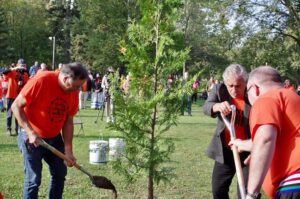Fort William First Nation and Thunder Bay come together to honour Indian Residential School children and Survivors

By Rick Garrick
THUNDER BAY — Fort William Chief Peter Collins and Thunder Bay Mayor Bill Mauro stressed the importance of remembering the children lost at Indian Residential School during Thunder Bay’s Sept. 30 tree planting ceremony at Vickers Park.
Thunder Bay Councillor Kristen Oliver and City of Thunder Bay Anishinaabe Elders Advisory Council Elder Kerry McLaughlin also participated in the ceremony to commemorate children sent to Indian Residential Schools and to honour Indian Residential School Survivors and their families at Vickers Park, which is located about half a block west of the former St. Joseph’s Indian Residential School site on Arthur St.
“Like I said at our Sunrise Ceremony this morning (on Anemki Wajiw), the great weather we have here today is the young ones that never returned home shining upon us and guiding us here today as we work in remembrance of them,” Chief Collins says. “When we talk about the city with the big heart, today is showing that big heart, the tree that is going to resemble the growth of the young ones that never got to grow, but also in memory of the survivors that have to deal with the fallout of residential school and the stark reminder that they recently had when they found several unmarked graves in Kamloops and other parts of Canada.”
Chief Collins says he has talked with some survivors about how they were impacted by the discovery of the unmarked graves at former Indian Residential Schools.
“That’s a stark reminder of what needs to change — we have to continue that path and continue that journey,” Chief Collins says.
Chief Collins also encouraged people to join in at the Fort William Fall Pow Wow that was held from Sept. 30-Oct. 1 at Anemki Wajiw.
“As I said on the mountain this morning, we don’t get to hug each other anymore, so what I’ll do is a virtual hug to everyone,” Chief Collins says. “But the most important part is hug your child today — they are our most valuable and most precious children that we can ever have in our lives.”
Mauro says he was pleased to see the support for Orange Shirt Day, which was inspired by the story of Phyllis Webstad, who had her brand new orange shirt taken away from her at residential school, with people wearing orange shirts across the city.
“Today is also the first official National Day for Truth and Reconciliation,” Mauro says. “The city recognizes this day and its deep importance as we respond to Truth and Reconciliation Call to Action #80, a national day to honour survivors, their families and communities and to ensure that the public commemoration of the history and legacy of the residential schools remains a vital component of the reconciliation process.”
Mauro says the planting of the cedar tree is the start of a memorial grove that will be a permanent presence in the city. Cedar tree saplings were also provided for participants to plant at their homes.
“Planting this tree, while a small act, is one with great significance — through this tree, we are remembering the past, we are honouring those who have been lost and those who continue to struggle and forever planting a reminder that every child matters,” Mauro says. “Trees hold a lot of symbolism and by planting this one we are looking to the future — this tree and those like it planted across our city are acts of reconciliation and steps towards creating a better future. The city will nurture this tree, just as we seek to nurture our relationship with Indigenous communities and partners. I look forward to seeing it grow and for all of our citizens to understand its importance as we work towards fostering an atmosphere of reconciliation in our city.”


